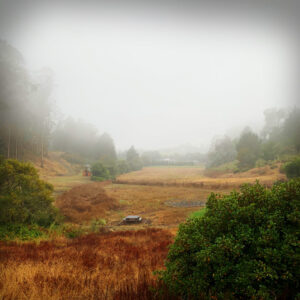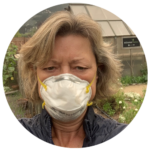The house was on fire. Or the barn was on fire. Something was definitely on fire.
On Friday morning, August 25, I woke with a start at 4:30 am because something was clearly burning. I jumped up and looked out the window. No fire. I dashed to the other side of the house to check the barn. Nothing.
We’d been on high alert for over a week now as the CZU Fire burned our friends out of their homes and farms on the south coast of San Mateo and Santa Cruz counties. I have never used the word “heartbreaking,” so often in one week. Was there a new fire about to overtake my neighborhood?
 I stepped out the back door to see what was happening, and the smoke hit me like a wall. The wind had shifted overnight, and the air quality in Half Moon Bay went from the brisk fresh air we relish to a soggy mess of particulate matter trapped by the marine layer. This was not air you could breathe without serious health consequences. I shut the door, closed the windows all over the house, and took the new air purifier (that our daughter had given to us just the night before) out of the box. And tears sprang to my eyes. No fire—just the smoke from the burning farms and forests heading to our neighborhood.
I stepped out the back door to see what was happening, and the smoke hit me like a wall. The wind had shifted overnight, and the air quality in Half Moon Bay went from the brisk fresh air we relish to a soggy mess of particulate matter trapped by the marine layer. This was not air you could breathe without serious health consequences. I shut the door, closed the windows all over the house, and took the new air purifier (that our daughter had given to us just the night before) out of the box. And tears sprang to my eyes. No fire—just the smoke from the burning farms and forests heading to our neighborhood.
I have spent nearly my entire career working in environmental stewardship and energy. I was in the audience with my son when Al Gore filmed An Inconvenient Truth. I’ve been a consultant, an advocate, and a regulator in California. And despite all that we might try to do as individuals, as communities, and as a state, the climate crisis is clearly on top of us. And I hope that I keep the memories of this past week seared in my brain for the rest of my life.
-Of my daughter fearing for the present and future of her young children.
-Of my friend evacuating to us without the comfort of a welcoming hug.
-Of farmers picking crops in N95 masks while helicopters drop flame retardant on the hills just behind them.
-Of the stunned faces on Zoom calls as we all try to pretend to be resilient and agile leaders.
-Of the number of times this past week, I have heard a friend say, “I am not sure I can stay here anymore. But I am not sure where I would go.”
These are unsettling times—and I am sure you have your own unforgettable memories of 2020. But I want these memories to motivate and empower us to do more and say more. We are out of time, friends. We need to be impatient. And if we have even one more conversation about the economy, equity, and the pandemic without including the reality of our warming planet in the conversation—we are, well, just fooling ourselves.
Over the next few months, the Sustainability Affinity Group of American Leadership Forum-Silicon Valley will be publishing a series of blog posts dedicated to providing information and resources to help us all make informed choices about our personal behavior, but more significantly about the public policy choices we must make to plan for and mitigate the impacts of a warming planet. Today, I want to leave you with one reference to an in-depth report done by The New York Times Magazine a couple of years ago. This will give you a history lesson on the science and public policy. It may leave you frustrated and even regretful—but we have to start somewhere, and knowing the journey to date is a good starting point.
I hope you join us as we learn, reflect, and consider how we might change the ways we care for a planet that is screaming at us to do things differently.

Jayne Battey, Class XXIV
ALF-SV Board of Directors
Vice-Chair San Francisco Bay Regional Water Quality Control Board
Owner, Miramar Farms
Jayne is the founder and owner of Miramar Farms, a leadership development center north of Half Moon Bay. Jayne provides senior leadership coaching and facilitation for organizations working primarily on environmental, health, housing, and education work. She is vice-chair the San Francisco Bay Regional Water Quality Control Board and previously served on the boards of the Silicon Valley Community Foundation, Youth Outside, and Cabrillo Education Foundation.
Prior to starting Miramar Farms, Jayne held executive roles in three organizations—as Director of Land and Environmental Management at Pacific Gas and Electric Company, as Executive Director of Pacific Forest and Watershed Lands Stewardship Council, and as founder and President of Essex Environmental.
Jayne received her Masters of Science degree from the London School of Economics and Political Science and her bachelor’s degree from Boston College. She is certified in the Everything DiSC® and Five Behaviors® leadership curriculum. Jayne is a Senior Fellow of the American Leadership Forum, Class XXIV.



